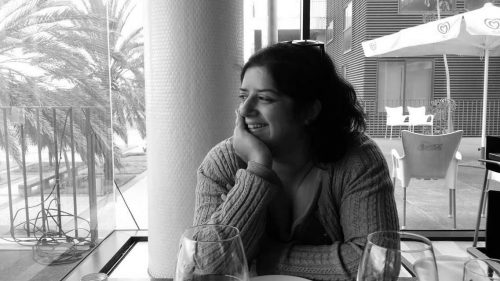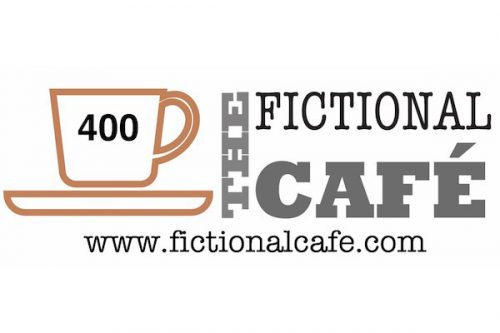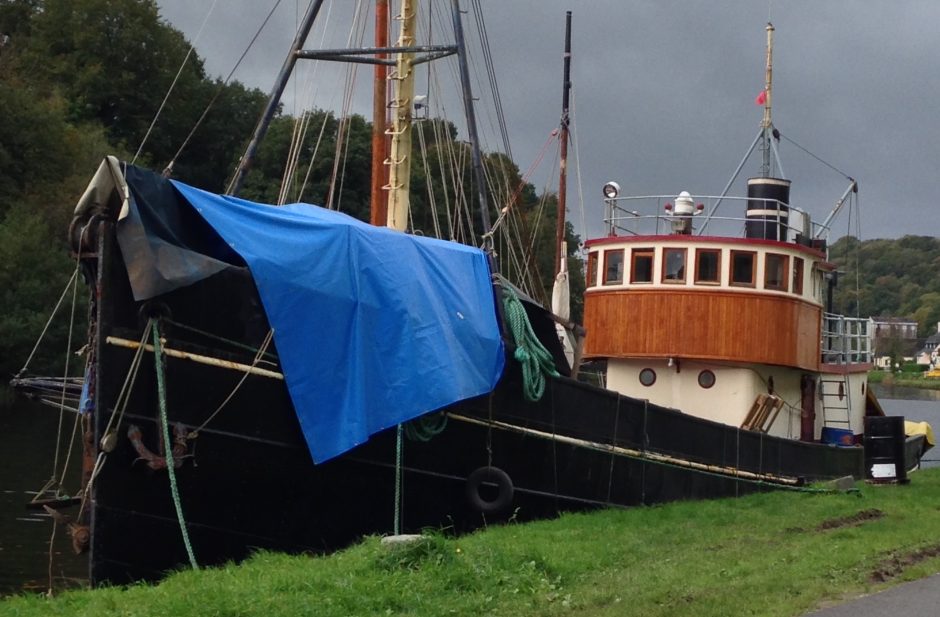I’m watching Balan hide his second mobile phone in the glovebox of his emerald-green Porsche, the phone he always uses when he has an new girlfriend. I decide not to tell him about the plane ticket. Impulse or resolution, it takes me out of my comfortable flow.
At the beginning of the flight, the roar of the engines causes me to yawn and tense the muscles in my neck. These are the warning signs, my habitual prodome.
In the middle of the flight, the light on the ocean forms strings of rhinestones and sapphires, like a Turner painting. This could be seen as good luck.
At the end of the plane ticket there is Boston’s Logan airport and a red-haired, blue-suited lawyer holding up my old name on cardboard: ‘V. Dutta.’
“Mrs Dutta, ” she says, raising one eyebrow.
“Call me Velena.” That’s the most we speak.
What I want you to remember is, there’s no objective advice, just persuasive opinions.
Boston smells faintly like molasses, and is full of parks and people walking. Hopefully they’re going somewhere. Once, two thieves posing as policeman stole paintings worth about $500 million from a museum you’ve never heard of. Confidence is all it took.
At the lawyer’s office is a letter from my Uncle Terrell, and a picture of a fireboat. The boat is black-hulled with white trim, and has ‘Fire Rescue’ unavoidably painted on it in red letters.
The first migraine of the escapade arrives in the hotel room, bringing wavy lines to the left and fractured pieces of my chubby, shaven-headed, denim-jacketed seatmate from my bus journey to the airport. He’s now sporting one giant green eye that dissolves into a map of Greenland. I close the grey linen curtains, shut my eyes and watch the pieces dance.
On ocean waves you’re a tiny thing, like a Seurat dot or the micro-organisms in a drop of water under Robert Hooke’s microscope.
A fireboat is a riveted steel plate boat, fully equipped for firefighting or as a refueling vessel. And, I, an art historian from Liverpool, mother of two grown-up children, bulwark of a serene family and a troubled marriage, now own one.
The letter says, ‘the best captain I know is Wardell Tate, he can fix you up with a crew. I always wanted to sail her to Iceland’.
I give my pencil skirts and cashmere jumpers to Goodwill and buy jeans and a waterproof coat, striped like a Rothko. I wash the trousers in the hotel bathtub, scrubbing away the newness.
The constellation of boats at the waterfront, gently bobbing, draws my eyes to the waters of the Mystic River flowing into Massachusetts Bay, tumbling into the Atlantic ocean. How do people know where one starts and one ends?
There is urgency in the decision to sell or sail. The fireboat is about to lose its moorage. The red-haired lawyer has a list of the scrap value of the immaculate brass fittings, and the distance and hazards between Boston and Iceland. Uncle Terrell’s letter is creased from the way I clutch it, like a life-vest. I can sell it after the voyage, to have something tangible to take away.
The fireboat is tethered with long lines of rope to the dock. Long lines mean less tension, and more durability in the rope. The angles are important. This is one of the lessons I have to learn.
Faces peep out as the boat launches. Reedy voices chant ‘Fire Rescue.’ Their rapt attention makes me shift. Tom, the mate, sets off the fire nozzles, powered by sea water. He says it’s important all our capabilities are tested. People produce the co-ordinated gasps most commonly heard at firework displays. Tom is grinning as if he’s found gold.
This is how we set forth: fire in the engines, surrounded by puffs, breaths, currents of air. In and of the water.
When you tell your story, you search for the truth. But it’s been bouncing around the echo chamber of your head, sucked in and out of neural pathways, randomly buffeted by electrical impulses. What you put in is not what comes out.
The first stop is Bar Harbor in Maine with its rocky coast and granite cliffs. We hike the Shore Path trail and kayak in search of elusive seals. Lobsters wave feelers from behind the walls they can’t see. My stomach settles when we’re back on the boat.
Sofia, the pilot, is focused and hard-working. She never uses an unnecessary word. Her chestnut eyes are spider-webbed by the tiny lines you achieve when you’re not afraid to stare into the sun.
I am the deckhand; no resources wasted on a long voyage. I swab decks, move barrels, keep watch. I try, but cannot pretend these things are a hardship.
Captain Wardell makes great vegetable curry, swimming with coriander seeds and flecked with dried mint. He likes to grind the spices small.
The first few days are overcast and the nights are cold. The scrap value of the brass fittings becomes more important. One morning, with the wind behind us, the dawn brings wispy clouds, a navy blue sea and sunlight on water. Even Turner’s seascapes never made me taste the salt spray, like when you cut yourself on paper and seal your mouth over the tiny, agonizing wound.
The air, the sea, the light on the water are immense and immutable. We change only our clothes, who’s on for first watch, what’s for dinner. Sometimes I don’t change my clothes.
The second migraine is after two glasses of red wine, one too many for my trigger plan but some things call out to be finished. Twinkling lights dance around my cabin and dissolve into snowflakes falling onto mountains and black-roofed, brightly painted wooden houses. They almost compensate for the tunnel vision, the dizziness and the tingling under my left eye.
The first time I went snorkeling, in the shallower waters near the sandy beach of the Negril coast, I saw a sea turtle. It looked me in the eye, pupil to pupil, and waved at me. This is both unlikely and the purest interaction I’ve ever had.
Uncle Terrell and Aunty Petal were watching, making sure I came back up. She was alive then. She broke out her warm smile, the one like a string of sapphires or a Turner seascape, and said ‘well, don’t you like to go deep.”
My father would have loved the firefighting system, the pumps supplying sea water, the fire monitors, the nozzles. He would have told the story of how, in his first week on the job, he ran into a burning house in Savanna-La-Mar and brought out a dog for a sobbing child. Away from the black acrid smoke, it became a large teddy bear, one eye missing and one ear singed. She clutched it all the same, like a life vest.
Newfoundland is perched on the eastern edge of North America, where the warm Gulf Stream and the cold Labrador currents mingle. It’s great for spotting whales, and icebergs. At a distance, with expectations, they’re not dissimilar.
The thing about watching sea and sky is all the things you see reflected.
Captain Wardell charts the course, and patiently teaches about weather systems and storm-force winds. He joins me on first watch and explains that a hurricane is the first appearance of lowered pressure and organised circulation. I learn what to look for.
Schools of flying fish leap for air as if they’ve never tasted it before. Out of the water they arc like silvery rainbows, then glide back into the water. Are they masters of two mediums or victims of the pace of evolution?
That the captain is five inches taller than me, and my head could rest on his shoulder, and that his arm next to mine on the railing is darker-skinned and muscled with long threads of veins that disappear under the rolled-back sleeves of his red wind-breaker, is not important.
I walk below deck, among the barrels of potatoes and onions, stacks of peanut butter and sacks of raisins. The smells of nutmeg, coffee and citrus mingle into complex perfumes. My favourites are the brightly-coloured packets of rice noodles with pictures from cartoons I have never seen. I trace the mysteries of blackly inscribed letters and wonder if I will ever know how far they’ve travelled.
My parents met on a dock in Montego Bay. She’d just left the Navy and was working on a cruise ship. He’d attended four fires and rescued one cat. They saw in each other the tools for success.
The second time I went snorkeling, before the girls were born and while Balan sweatily lounged and flirtily ordered sangria from bored waitresses, I saw decaying tangles of seaweed and a large dead grouper. Its eyes were unreflective black domes, and its mouth was torn out. Feelings slip through cracks in retellings, not to be recaptured.
Wide-winged frigate birds swoop down, streamlined, and pluck unsuspecting fish from below the water’s surface.
Red Bay is the oldest settlement in North America. The ghosts of Vikings and whales compete to permeate unwitting visitors, who shiver with unexpected chills. The rugged coastline is dotted with thick forests, precarious bird colonies, tiny alpine flowers. All successful in the different ways they’ve found to hang on.
My mother would have loved the fireboat’s fuel transfer system, the internal steel tanks with black iron piping. She never met a valve she couldn’t master or a boat engine she didn’t want to pull apart.
The third migraine slides from the vibrations of the engine of a passing cruise ship into a throbbing behind my eyes and numbness in my legs. I slide onto the deck and watch wide-winged shadows liquefy into floating black wooden roofs swooping down, streamlined and unchanging.
Sofia shows me how to tie down my mother’s twenty years’ service silver-plated clock in the cabin. It’s important to secure things against the unpredictability of the waves. I keep my other memory in my suitcase, my picture of the twins on their first day at Sheffield University. They’re frozen in their contentment to be constantly confused. Would they miss me if I leave? Or would they understand the need for self-discovery?
The night of the first storm, the boat shivers until the clock chimes with the thunder. Out on deck the lightning comes down in streams and forks, joining sea and sky, The air is charged with electrical particles and smells cleansed. Like the aftermath of wiping away cobwebs or erasing disc-space.
But if you asked me to rank my parts in order, I’d start with my Manglorean grandmother cooking the rice she’d grown in her own fields in a dented steel pot on the embers of a fire made from her own trees. That’s the story that Balan listened to, the earth woman, the competent caretaker. She could ring chicken’s necks with her bare hands. We didn’t talk about that, but it’s there.
Tom likes to sing, but not sea shanties. ELO, Queen, The Beach Boys, Heart. Big songs that benefit from the percussive background of wave on hull, of wave on wave. I fall asleep every night humming ‘Killer Queen.’
I sold my jewellery before I left. I mention it now because the sun on the waves gave it back to me. The diamond necklace, the platinum rings, the opal earrings. I didn’t mention it before because you’d know before I did that I wasn’t going back.
It’s bitter as we pass through the Labrador current, with Greenland in our sights, the winds coming straight from the Arctic circle. The water is so calm it shines like glass. I watch out for icebergs anyway. I have experience with the shocks that await those who think themselves unsinkable.
The rest of the letter from my uncle said, ‘when it comes right down to it, can you do what needs to be done.’
There can be good reasons or bad reasons for anything. But those are what you tell yourself after. It’s guaranteed to blow your mind.
Sophia ties knots, her hands like poetry. Sheet bends, stoppers, clove hitches. In a box, next to driftwood and shells, they’d fit in with Paul Nash’s ‘found objects’.
Sometimes, I think Uncle Terrell was trying to give me a chance for a happy life with a man he approved of. But the sun on the waves gave things back to me I didn’t know I missed.
I’m supposed to say this was about the voyage, about finding myself or something like that. But discovery takes time, not space or other people. A passage through the obstacles you’ve likely placed for yourself.
I’ve not finished, though. This is just where I’ve stopped.
***

Anita Goveas is British-Asian, based in London, and fueled by strong coffee and paneer jalfrezi. Her story ‘Tarantulas are slow but deliberate’ is in the 2016 London Short Story Prize anthology, and ‘Neural Plasticity’ was published by Dodging the Rain.


